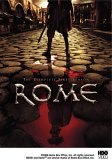| Reviews & Columns |
|
Reviews DVD TV on DVD Blu-ray 4K UHD International DVDs In Theaters Reviews by Studio Video Games Features Collector Series DVDs Easter Egg Database Interviews DVD Talk Radio Feature Articles Columns Anime Talk DVD Savant Horror DVDs The M.O.D. Squad Art House HD Talk Silent DVD
|
DVD Talk Forum |
|
|
| Resources |
|
DVD Price Search Customer Service #'s RCE Info Links |
|
Columns
|
|
|
Rome - The Complete First Season
"The die is cast." - Gaius Julius Caesar
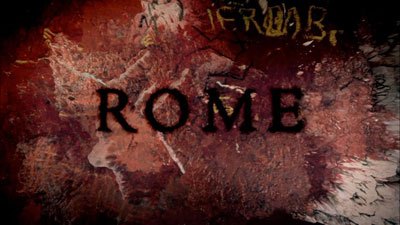
INTRODUCTION:
Few civilizations in the world carry the historical weight and intrigue of Ancient Rome. Along with Ancient Greece, the Romans established (or assimilated) much of what would eventually become "Western Civilization", ruling over Western Europe and the Mediterranean, in one way or another, for the better part of a millennium. Their social cultures, military conquests, and ever-changing styles of government have fascinated authors and historians for centuries, so it's no wonder film and television producers continually return to this unique period in history as the setting for so many stories. The latest journey into this ancient civilization is the product of a $100 million dollar partnership between HBO and BBC, and it is arguably the most historically accurate presentation of the period as well as one of the most ambitious television projects ever produced. Rome's first season drops the viewer right into the middle of one of the biggest turning points in Roman history, telling an 8-year story across 12 episodes, and it is now presented on DVD in one of the most impressive television releases to date.
CONTENT:
The year is 52 BC. With the execution of Marcus Licinius Crassus after the Battle of Carrhae, two men now control the Roman Republic: Gaius Julius Caesar (Ciarán Hinds) and Gnaeus Pompeius Magnus aka Pompey the Great (Kenneth Cranham). Caesar, a military genius and ambitious conqueror, has been away for years fighting in the Gallic Wars and has just achieved a major victory against Vercingetorix (Giovanni Calcagno) at the Battle of Alesia. Meanwhile, in Rome, Pompey and his fellow Senators have grown concerned that Caesar has designs to become King upon his triumphant return from battle, and they begin to hatch a plan that will discredit him and remove him from power. On the surface, Rome's first season chronicles Pompey's attempt to wrest control of the Republic from Caesar and the events that would eventually lead the powerful nation into civil war. Beneath the surface, however, Rome creates an often more compelling story of two soldiers caught in the middle of the madness: Lucius Vorenus (Kevin McKidd) and Titus Pullo (Ray Stevenson).
While Caesar and Pompey are the stars of the city, Vorenus and Pullo are the stars of this television series, bouncing around through history like the Rosencrantz and Guildenstern of Ancient Rome. Vorenus is a professional soldier to the core, honorable, loyal, and a true servant of the Republic. As a centurion and First Spear of the XIII Legion, he has a great deal of responsibility and has been away from his wife and children for the past 8 years fighting the Gauls with Caesar's armies. Pullo, a legionary under Vorenus's command, is the polar opposite, a brash and self-serving warrior who doesn't respond well to authority figures. For all their differences, these two men share a common loyalty to Rome and a desire for something more in life, and circumstances allow them to form an unlikely friendship that spans the course of the season.
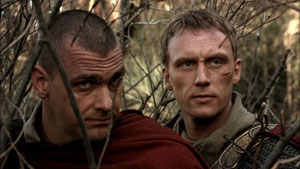
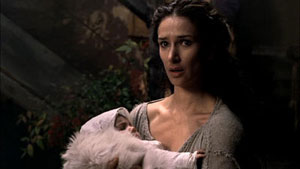
What is interesting about these two characters is that they are legitimate historical figures, both mentioned in various writings on the Gallic Wars (although, both were centurions). With the end of the wars and Caesar's return, however, their story ends. Since the paths of most of the characters in this series are pretty much set in stone and known to a large portion of the viewership, the writers have creatively taken these two individuals of unknown futures and woven them into the series with new and interesting stories that give us somewhat of an everyman's view of the grand events that take place. Upon his return, Vorenus has to find a way to rekindle his relationship with his staggeringly beautiful wife Niobe (Indira Varma). Married at a young age and spending much of his adult life on the road or in battle, he doesn't fully understand how to relate to her or their young children. He wants to do right by them, but that means removing himself from the traveling military, and finding his place in society without a sword in his hand proves to be a difficult prospect. In similar fashion, Pullo knows almost nothing but being a warrior, and worse, he has no family to come home to. It is a bit unrealistic, and at times somewhat comical, that these two men would find themselves attached to so many pivotal moments in history, and using them all the time almost makes the show seem a bit small in stature; but they're just such wonderful characters who breathe so much life into the show that it is completely forgivable.
Not to be forgotten among the large-scale political maneuvering that will change the face of the Republic forever, Rome spends a great amount of time focusing on a few key members of the various political families, most notably Caesar's niece Atia (Polly Walker) and his lover Servilia (Lindsay Duncan). Atia is the mother of Octavia (Kerry Condon), a shy and weak young girl who is often the pawn in her mother's political games, as well as Octavian (Max Pirkis), an incredibly perceptive and intelligent young man who will grow up to be one of the most influential figures in the history of the world. Atia's power is not recognized in any formal capacity, but her influence behind the scenes is vast, and Walker does a great job with this fiery role. Servilia also has a significant amount of influence, often more than Atia, and her importance to this historic tale stretches beyond her love affair with Caesar and into the hands of her noteworthy son, Marcus Junius Brutus (Tobias Menzies). Brutus is one of Caesar's closest friends, often treated like a son, and he faces great inner turmoil through much of the season.
Many other key figures in Roman history are featured in the cast, including Caesar's fiercely loyal cousin and legendary soldier Marcus Antonius (James Purefoy), the great orator and moderate political leader Marcus Tullius Cicero (David Bamber), as well as two of Caesar's chief opponents in the Senate, Optimates leader Marcus Porcius Cato (Karl Johnson) aka Cato the Younger and Pompey's father-in-law Metellus Scipio (Paul Jesson). While these characters are used mostly as signposts through history, each of them is given a few moments of individualism, particularly Mark Anthony, who will likely feature prominently in the season to come.
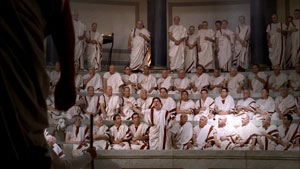
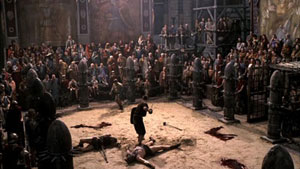
In terms of costuming and set design, Rome is almost in a class by itself. With incredible period dramas like Deadwood and Carnivàle airing on the same network, it would not be fair or accurate to say this show is incomparable, but it sure is close. Whereas so many previous productions have mixed and matched various cultures and eras to create a "Hollywood" version of Ancient Rome, this series has made every effort possible to get it right, and it certainly shows. Filmed in Italy for that extra level of authenticity, the disparity between the classes in terms of clothing and living quarters, the organization of subura, the general structure of the city, and even the formations and strategies of the military are all beautifully rendered in this series. Watching it is a near complete immersion in this fascinating period of history, and much credit should go to the creative staff for infusing every aspect of the show with clever and often very subtle touches of historical accuracy that may go unnoticed by the casual viewer but add a great deal of legitimacy to the project. (I should probably also note that the series revels in the decadent nature of the era and complete lack of sexual inhibition, so it is incredibly graphic. Sensitive viewers beware.)
Unfortunately, something is missing from the show. For all the warmth and depth of characters like Vorenus and Pullo, there is sometimes a mechanical nature to the more famous figures. By its very nature, Rome has to walk a fine line between chronicling history and telling a dramatic story, but at times it drops the ball in both areas. Certainly the writers have taken numerous liberties with history, combining certain figures into a single character and bypassing somewhat lesser events, and I don't intend to nitpick those aspects of the show, as it's perfectly understandable and often entirely necessary. However, by losing some elements of history and rushing through 8 years of conflict in only 12 episodes, some of the presentation is not nearly as coherent as it could be. An early example is the death of Caesar's daughter and Pompey's wife Julia (don't worry -- not a spoiler). The show has already ignored the existence of the third member of the legendary Triumvirate (Marcus Licinius Crassus), so it's not entirely clear how or why these two men share power to begin with, but Julia's death followed by Crassus's death marks a major turning point in the relationship between these great leaders, and when Pompey turns from Atia's offering of Octavia in favor of Metellus Scipio's daughter, the greater import of that development is largely lost within the personal drama. There are many such events like this, particularly in the early episodes, where some very interesting and important historical developments are not completely addressed with clarity, and it's very possible for the casual viewer to get lost in what is happening between these characters and just why they are acting the way that they are. What ultimately results is that certain scenes come across a bit hollow, because years are passing by in a single episode and we don't have the necessary background to appreciate the character's motivation, making him sometimes feel more like a pawn in the historical record than a fully realized individual.
On the whole, though, the series finds a pretty solid balance between these issues, and considering the scope of what they are trying to accomplish, I cannot fault them too much for slipping in a few areas. With so much of the story revolving around two fantastic characters in Vorenus and Pullo, as well as some wonderful material with Octavian and Octavia, it is easy to forgive some of the more cumbersome scenes and embrace what is truly great about this show, and there certainly is a lot of it. While it takes a little time to fully find its stride, the season builds very well to an incredible conclusion with the final two episodes, and some of the more minor characters who will almost certainly feature prominently in the next season are established very well. Rome is not a perfect show, but it is very, very good, and in terms of a bringing such epic history to the small screen, it is probably the best in its class.
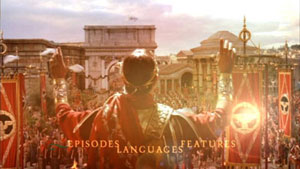
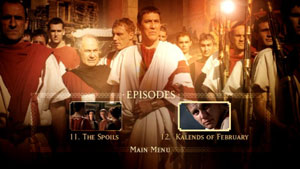
PRESENTATION:
Wow. Really. Wow. The good folks at HBO have outdone themselves with this one, and considering how nice many of their releases already are, that's saying something. First off is the packaging, a gorgeous wooden box that is hinged in the upper left corner and opens to reveal a beautiful 6-panel foldout with photos and episode descriptions. The hinge is quite thin, so there may be a risk of future tearing, but hopefully it will be strong enough to withstand reasonable use, because it makes for such a nice enclosure. Mine survived this review just fine. The episodes are spread across 5 DVDs with a 6th disc devoted to special features. Also included is a small foldout character guide that gives a quick rundown of who these people are. If you're not pretty familiar with Roman history to begin with, it could be a bit daunting to keep up with everyone at the start, so this might be a welcome addition for some people. The artwork on the box, on the discs, and throughout the panel is top notch.
Also top notch are the audio and video on this set. I looked, and I listened, but I couldn't find a single thing wrong with it. I cannot recall a television series that has looked or sounded as good as this one. Presented in 16x9 with anamorphic enhancement, the video captures the myriad colors of the city and maintains a great balance between indoor and outdoor scenes. The audio is available in English 5.1 as well as both English and Spanish 2.0. The 5.1 mix is excellent, with great use of the surround channels and a nice balance between dialogue, action, and music. You pay extra for these sets, but HBO really tries hard to justify it, and this release is about as good as it gets. Even the animated menus are highly creative, blending the text buttons for the menu into the shifting background.
WHISTLES & BELLS:
More kudos to HBO. Included on this set are an incredible 8 Audio Commentaries, 4 with writer/producer/creator Bruno Heller & historical consultant Jonathan Stamp. There's a lot of dead time in some of these, but there is also a wealth of information if you are interested in some of the history and behind-the-scenes for the show. Frustratingly for me as a reviewer, half of the material I wanted to write about in this review is already addressed in these commentaries, so it's clear these men know what they're doing and have given a lot of thought to the entire process.
Jonathan Stamp also provides Text Commentary on every single episode in the form of a feature called "All Roads Lead to Rome". As you watch the episodes, periodically some textual information will appear on screen that provides more details about what is happening in the show. Even further, sometimes you can press the "Enter" button on your remote to pause the episode and go to a separate panel with yet even more information. While there is some overlap between the commentaries, there is quite a bit of additional information here, and if you're really into the historical aspect of the show like I am, you will likely find these to be very informative and enjoyable. I cannot remember another release where a historical consultant has been featured so prominently on the DVD, but I think it's fantastic to see here and entirely appropriate, and Stamp represents himself incredibly well.
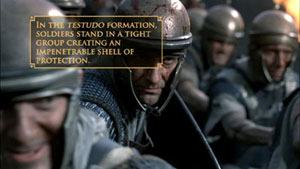

There are essentially 5 Featurettes spread about the discs. "Friends, Romans, Countrymen" (11:01) is on Disc I and is a brief introduction to the characters in the series. I suspect this was included to address complaints that it was difficult to keep track of everyone. It is largely spoiler-free, and if you think you might struggle with the characters, you may want to watch this before starting, or perhaps between the first and second episodes. On Discs IV and V are two featurettes under the heading "Shot x Shot", but that is somewhat of a misnomer. They each focus on a certain major scene in an episode, but there's nothing "shot by shot" about it. That's not to say they're not both very interesting and informative, because they're definitely worth watching. On the episode "Triumph", the "Shot x Shot" (22:50) focuses on Caesar's grand celebration, and on "The Spoils" (23:00), it details the creation of a gladiatorial combat sequence. Disc VI contains the last 2 featurettes: "The Rise of Rome" (23:35) and "When in Rome" (22:40). The former goes into detail on the elaborate set design and costuming while the latter focuses more heavily on the culture of Rome, their worship of the Gods, their social structure, etc.
Finally, on Disc VI, there is a Photo Gallery with 53 still photos.
CONCLUDING THOUGHTS:
Ancient Rome is one of the most interesting civilizations in world history, and "Rome - The Complete First Season" captures a small slice of that history very well. Trying to balance both the large-scale events that changed history with the more personal stories of those who are behind the scenes, the series stumbles in a few places early on, but it is mostly a huge success and an engrossing experience that is much stronger than other historical epics. There is so much detail and nuance to the project that it makes for an entertaining experience for both the history buff and the casual viewer. With gorgeous packaging, near perfect audio/video presentation, and some nice special features, this set justifies its high cost. Highly Recommended
|
| Popular Reviews |
| Sponsored Links |
|
|
| Sponsored Links |
|
|
| Release List | Reviews | Shop | Newsletter | Forum | DVD Giveaways | Blu-Ray | Advertise |
|
Copyright 2024 DVDTalk.com All Rights Reserved. Legal Info, Privacy Policy, Terms of Use,
Manage Preferences,
Your Privacy Choices | |||||||









